President of Bamvango
| President of the Republic of Bamvango | |
|---|---|
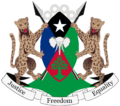 | |
| Style | Mr. President His Excellency |
| Type | Head of state Head of government |
| Residence | President's House, Jombo |
| Appointer | Parliamentary National Assembly of Bamvango |
| Term length | 5 years renewable once |
| Formation | 2 December 1946 (inaugural) 17 October 2014 (current constitution) |
| First holder | Johnathan A. Akech |
| Deputy | Vice President of Bamvango |
| Salary | BVS 500,000,000 (€209,812.156) annually |
| Website | www |
The President of the Republic of Bamvango is the head of state and government of Bamvango, making them the highest executive office-holder in the government of Bamvango. The president is also the commander-in-chief of the Bamvangan Armed Forces (BAF).
The president is elected by the Parliamentary Assembly where they must hold a majority of seats in order to govern. The president is entitled only to two five year terms under the current constitution passed in 2014 albeit under previous versions there were no term limits applied to the presidency. The current president is Anthony Benoudjita who was elected to the post in October 2014.
The position of head of state has been subject to frequent change due to the instability of Bamvango since independence with the country having suffered numerous coup d'état's and civil conflict. From 1962-64, 1987-91 and 2014 the position of president was superseded by interim military governments. From 1977 to 1987 the position of president was abolished in favour a military dictatorship led by the Supreme Commander of the Security Commission.
The president is required to be a member of the Parliamentary Assembly at the time of his election. Upon his election, he immediately resigns his seat for the duration of his term. The president may be removed either by a motion of no-confidence or an impeachment trial.
History
Appointment
Duties
Amenities
List
- 1947-1977 - President of the Republic
- 1977-1987 - Supreme Commander of the Security Commission
- 1987-1991 - Chairman of the Revolutionary Committee
- 1991-2014 - President of the Republic
- 2014 - National Transitional Council
- 2014-present - President of the Republic
| No | Picture | Name | Term | Tenure | Presidential mandate | Affiliation | |
|---|---|---|---|---|---|---|---|
| 1 | 
|
Johnathan A. Akech (1904-1962) |
- | 2 December 1946 |
11 March 1947 |
Interim president | Bamvangan National Rally |
| 1 | 11 March 1947 |
27 May 1950 |
1947 | ||||
| 2 | 27 May 1950 |
14 May 1955 |
1950 | ||||
| 3 | 14 May 1955 |
18 May 1960 |
1955 | ||||
| 4 | 18 May 1960 |
7 August 1966 |
1960 | ||||
| The first president of Bamvango Akech led the colony to independence in 1946 with his Bamvangan National Rally (BNR) party gaining a majority in elections in 1947. Akech a committed socialist intended to modernise the colony garnering strong support from leftist student groups and trade unions, consolidating power following the 1950 snap elections. Akech subsequently led bold land reforms, socially progressive policies and policies intended to develop Bamvango through nationalisation and investment in industry. However he was frequently was accused of being authoritarian and concentrating power in his own Welke ethnic group, as well as being fiercely opposed by powerful landlords and cotton farmers'. In 1966 he was overthrown and killed in a coup d'état that was widely suspected as having been ordered by Estmere. | |||||||
| 2 | 
|
Armel Yombandje (1925-1971) |
5 | 7 August 1966 |
22 May 1970 |
1966 | Bamvangan National Rally |
| The vice-president to Akech, Yombanjie was brought to power by the military. He was seen as a puppet to Joshua Ngakoutou who held real power in the Security Commission. Yombandje was considered the more pro-Estmerish of the two but in 1970 resigned after opposing Ngakoutou's consolidation of power. | |||||||
| 3 | 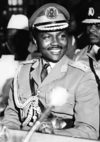
|
Brig. General Joshua Ngakoutou (1932-) |
- | 22 May 1970 |
16 November 1972 |
Interim president | Military Bamvangan National Rally-Bahian Union |
| 6 | 16 November 1972 |
3 March 1977 |
1972 | ||||
| Initially Ngakoutou came to power under the strong guidance of Estmere, reversing some of Akech's policies and instituting a more economically liberal course. Ngakoutou nevertheless attempted to ensure a convergence of military and reformist elements within his government and so balanced a pro-Estmerish foreign policy with populist measures. He sought to emphasise Pan-Bahianism as his principal political objective attempting to create a confederation with The Magadi. Ngakoutou also formed a single party state under a reformed Bamvangan National Rally, renamed the Bamvangan National Rally-Bahian Union (BNR-BU) replacing the CEC but this alienated him from his military allies. After facing a wave of unrest Ngakoutou was ousted whilst on a diplomatic visit to Cassier by the chief of staff Kashim Shehu. | |||||||
| 4 | 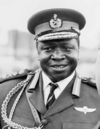
|
Mj. General Kashim Shehu (1935-1985) |
- | 3 March 1977 |
17 July 1985 |
Military president | Military |
| Ousting Ngakoutou in a coup d'état Shehu held a referendum that allowed him to suspend the constitution and rule by decree. Shehu would subsequently run one of the most brutal governments in Bahia torturing his opponents with meathooks and crafting an elaborate and increasingly bizarre cult of personality. Shehu's economic mismanagement and corruption in the wake of the 1980 worldwide recession led to his support to dissipate leading to Shehu to increasingly favour his own Kamba ethnic group. This triggered the Bamvangan Bush War during which Shehu was accused of promoting genocide. He was killed in the Estmerish Operation Fair Game in 1985. | |||||||
| 5 | 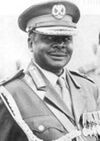
|
Brig. General David Oumarou (1926-1992) |
- | 17 July 1985 |
4 April 1987 |
Military president | Military |
| An army chief who had served under Shehu Oumarou established a temporary junta following the fall of Shehu with Estmerish support. He was however unable to garner further support as government forces faced a rapid series of defeats to the Bamvangan People's Revolutionary Organisation and in 1987 fled the country after BPRO forces took the capital Jombo. | |||||||
| 6 | 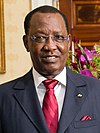
|
Field marshal Abdallah Ibrahim (1948-) |
- | 4 April 1987 |
17 June 1991 |
Interim president | Bamvangan People's Revolutionary Organisation Bamvangan Popular Renewal Organisation |
| 7 | 17 June 1991 |
14 June 1996 |
1991 | ||||
| 8 | 14 June 1996 |
15 June 2001 |
1996 | ||||
| 9 | 15 June 2001 |
20 June 2006 |
2001 | ||||
| 10 | 20 June 2006 |
18 June 2011 |
2006 | ||||
| 11 | 18 June 2011 |
5 February 2014 |
2011 | ||||
| Seizing power as head of the Bamvangan People's Revolutionary Organisation in 1987, Ibrahim concluded the Bush War in 1989 and secured a power-sharing deal as a result, leading the now-renamed Bamvangan Popular Renewal Organisation to electoral victory in 1991. In his first and second terms Ibrahim rebuilt the country after the damage of the Shehu regime and civil war but his push for a third term in 2001 led to repression and a return to authoritarian politics and ethnic favouritism. The economy had already begun to decline in the mid 1990's and further stagnated during the 2000's despite increased oil and mineral extraction. In 2010 the Patriotic Front for the Liberation of Bamvango began an insurgency due to Ibrahim's ethnic policies and in 2014 foreign powers withdrew support for his regime, causing his government to collapse and Ibrahim to flee the country. | |||||||
| 7 | 
|
Lawrence Kabadi | - | 6 February 2014 |
3 March 2014 |
Interim government | Bamvangan Popular Renewal Organisation |
| Ibrahims vice-president Kabadi briefly served as interim president after Ibrahim fled the country. He handed power to a transitional council after the Patriotic Front entered D'Jombo. | |||||||
| - | 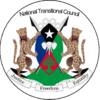
|
National Transitional Council | - | 6 February 2014 |
17 October 2014 |
Interim government | Various |
| Consisting of members of the Patriotic Front and government members cooperating with the PF the NTC oversaw the introduction of a new constitution and the holding of elections. It disbanded following the inauguration of president Anthony Benoudjita. | |||||||
| 8 | 
|
Anthony Benoudjita (1945-) |
12 | 17 October 2014 |
19 October 2019 |
2014 | Union of Progress and Democracy Democratic Rainbow Alliance |
| 13 | 19 October 2019 |
Incumbent | 2019 | ||||
| Elected as part of the Democratic Rainbow Alliance, a coalition of parties opposed to the former Ibrahim regime including Benoudjita's own UPD, Benoudjita has focused on ending insurgent violence in the country and restarting economic development that has been damaged due to the insurgency. In 2017 his vice-president and leader of the Patriotic Front Kuol Arop left the government to take up arms again escalating the insurgency. Benoudjita and the DRA were re-elected in 2019 against a weak opposition. | |||||||
